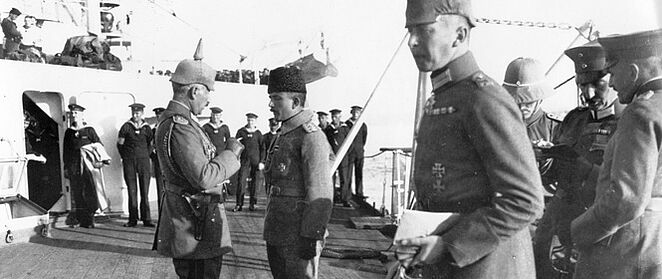THE GERMAN EMPIRE AND THE ARMENIAN GENOCIDE
International conference in Berlin, 1 to 3 March 2015

The systematic expulsions, death marches and massacres that the Armenian population of the Ottoman Empire were subjected to starting in April 1915 are often seen as the first genocide of the 20th century. It was indeed a crime of the century. Taking place during the First World War, it by no means went unnoticed: German missionaries, diplomats and above all military personnel were direct witnesses to the violent events. And yet the German imperial government still stood by the side of their Young Turk wartime allies, an unshaken brotherhood in arms. Almost exactly a hundred years after the genocide the question of the involvement and shared responsibility of the German players therefore arises anew.
At the international and interdisciplinary conference organised by the Deutsches Historisches Museum and the Lepsiushaus Potsdam, scholars will discuss the role of the German Empire during the Armenian genocide. How did the German imperial government react, how the diplomats and military officers? In what ways were the German and Turkish wartime allies dependent upon one another? What structures and avenues of humanitarian assistance were established during the First World War and could have been utilised? The conference on the occasion of the 100th anniversary of the Armenian genocide aims to paint a differentiated picture of the events at that time and to shed light on possible scopes of action that were open to the German side.
Simultaneous interpretation of all German and English talks is provided.
VENUE
Zeughauskino Deutsches Historisches Museum
REGISTRATION
Registration required, at anmeldung@lepsiushaus-potsdam.de
PROGRAMME
1 March 2015
18:00-18:30
Opening of the conference
18:30-20:00
Keynote address
Mark Levene (University of Southampton): Deadly geo-politics, ethnic mobilisations and the vulnerability of peoples, 1914-1918
2 March 2015
9:00-10:00
Registration
10:00-12:00
Panel I: German-Ottoman policy and the Armenian Question
Moderation: Rolf Hosfeld
Taner Akcam (Clark University, USA): The European Powers and the Armenian Question
Thomas Schmutz (Universität Zürich): The German role in the reform discussion of 1913-1914
Erik Jan Zürcher (Universität Leiden, Niederlande): Unionist decision-making 1913-1915
Ronald Suny (University of Michigan): Commentary
14:00-16:00
Panel II: The Imperial Government, the Foreign Office and the Armenian Genocide
Moderation: Roy Knocke
Martin Kröger (Politisches Archiv des Auswärtigen Amtes, Berlin): Die Armenienakten im Politischen Archiv des Auswärtigen Amts – Entstehung, Überlieferung, Möglichkeiten (The Armenian files in the Political Archive of the Foreign Office – Origin, transmission, possibilities)
Hans-Lukas Kieser (Universität Zürich): Wangenheim und das jungtürkische Komitee. Eine Geschichte von Hoffnung, Täuschung und Genickbruch (1913–1915) (Wangenheim and the Young Turk Committee. A history of hope, deceit and neck breaking (1913-1915))
Christin Pschichholz (Universität Potsdam/Lepsiushaus): Kolonialer Pragmatismus? Warum der Widerspruch aus dem Deutschen Reich gering blieb? (Colonial Pragmatism? Why few objections came from the German Empire)
Ashot Hayruni (Staatsuniversität Eriwan): Hätte die kaiserliche Regierung den Völkermord an den Armeniern verhindern können, ohne die Waffenbrüderschaft mit der Türkei zu gefährden? (Could the Imperial Government have prevented the Armenian genocide without endangering the brotherhood in arms with the Turks?)
Margaret L. Anderson (Berkeley): Commentary
3 March 2015
9:00-11.00
Panel III: The German Military in the Ottoman Empire
Moderation: Christin Pschichholz
Krethlow (Universität Bern): Der Armeniergenozid und das deutsche Militär (The Armenian genocide and the German military)
Jürgen Gottschlich (Istanbul/Berlin): "Hart, aber nützlich" – Hans Humanns Haltung zum Völkermord (“Tough, but useful” – Hans Humann’s position toward the genocide)
Ozan Arslan (University of Economics, Izmir): Wer steht in der Verantwortung an der Kaukasusfront? Eine Einschätzung der Entscheidungsprozesse und die angespannte Allianz zwischen dem Deutschen Reich und den osmanischen Offizieren, 1914–1918 (Who is in charge of the Caucasian Front?: An Assessment of the decision-making process and the uneasy alliance between the Imperial German and Ottoman army officers, 1914–1918)
Hilmar Kaiser (Pnom Penh): Die osmanische dritte Armee und die Vernichtung der Armenier im Bezirk Erzincan (The Ottoman Third Army and the Extermination of the Armenians in Erzindjan District)
Oliver Stein (Freie Universität Berlin): Commentary
11:00-11.30
Coffee break
11:30-13:00
Panel IV: German Involvement – Case Studies
Moderation: Rolf Hosfeld
Judith Perisic: (Universität Mainz): Die deutschen Verflechtungen beim Aufstand der Armenier und dessen Niederschlagung in Urfa (The German involvement in Armenian insurrection and its suppression in Urfa)
Margaret L. Anderson (University of California, Berkeley): Türkenjäckh: Porträt eines Wegbereiters (Türkenjäckh: Portrait of an Enabler)
Fabian Stremmel (Ehringhausen, BAMF): Das deutsche Kulturprogramm in der Provinz Aleppo und der Genozid an den Armeniern (The German Cultural Programmes in the Aleppo Province and the Armenian Genocide)
Hilmar Kaiser (Pnom Penh): Commentary
13.00-14.30
Break
14.30-16.30
Panel V: Humanitarian Network, Moral Politics and the Aftermath
Moderation: Peter Schöttler
Alexandra Przyrembel (KWI Essen/KHK Kolleg): Humanität in der Krise – die Massaker an den Armeniern (1895–1915) (Humanitarianism in Crisis – the Armenian Massacres (1895–1915))
Sigurd Sverre Stangeland (Collegium Hungaricum et Germanicum, Rom): Konsul Walter Rössler, Vali Djelal Bey und Beatrice Rohner – ein Triumvirat im Einsatz für die Armenier (Consul Walter Rössler, Vali Djelal Bey and Beatrice Rohner – A triumvirate on the side of the Armenians)
Rolf Hosfeld (Lepsiushaus Potsdam): Von der Moralpolitik des späten 19. Jahrhunderts zu den Anfängen internationalen Rechts (From the moral politics of the late 19th century to the beginnings of international justice)
Claire Mouradian (CNRS, Paris): Von Sèvres bis Lausanne: eine Frage von strafrechtlicher Vergeltung hin zur Entlastung (From Sèvres to Lausanne: the issue of retribution towards exoneration)
Raymond Kevorkian (Bibliothèque Boghos Noubar, Paris): Commentary
18:00
Public panel discussion
Venue: Schlüterhof, Deutsches Historisches Museum
